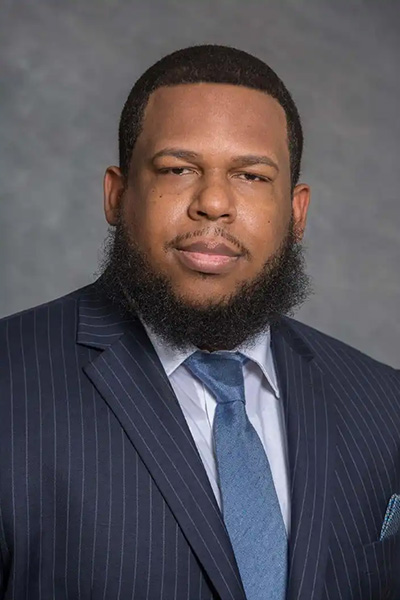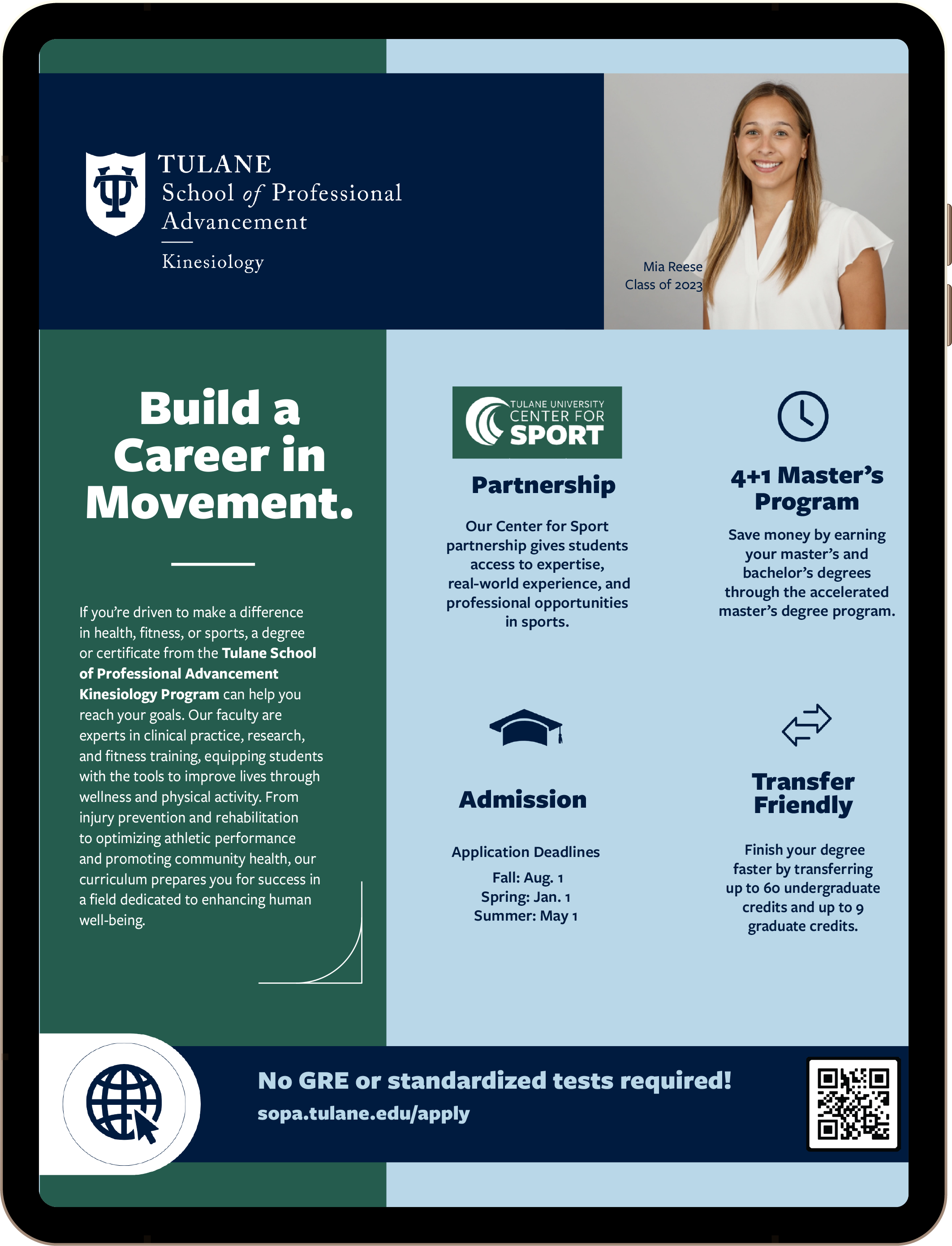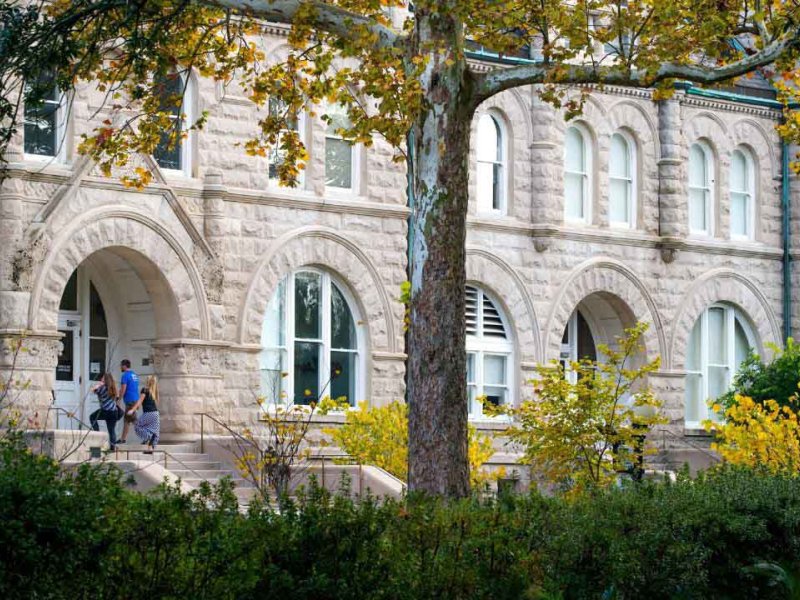Bachelor of Arts in Health and Wellness
Request Information
By submitting this form, you agree to receive information about the Tulane School of Professional Advancement’s programs via email, phone and/or text. You may opt out at any time.
Bachelor of Arts in Health and Wellness Degree at a Glance
TRANSFER
Transfer up to 60 credits to meet the 120-credit requirement. Earn your degree in two to four years.
FACULTY
Nationally recognized faculty who practice what they teach and help you succeed beyond the classroom.
LOCATION
Flexible online courses that match your schedule. Accelerate your career without putting your life on pause.
BENEFITS
Course credit for experience and 20% tuition discounts available.
ADMISSIONS
Rolling admissions. No test scores. No recommendations. Three start dates. We make the admission process easy.
What You Will Learn While Earning Your Degree in Health and Wellness
Our health and wellness bachelor’s degree program focuses on nutrition, personal fitness, health evaluation, risk behaviors, and healthy behavior changes.
This is the perfect field of study for those who want to become advocates for healthy living. Not only are our courses suitable for people just coming into the field, but this degree is also helpful for those who are currently working in the health industry and want to expand their level of expertise or focus.
- Stress Management
- Exercise & Sport Psychology
- Nutrition and Behavior
- Economics of Health & Wellness
- Gender Based Issues in Health
Students must complete 84 credits, or 28 courses, of general education courses and electives. Review the general education course requirements.
The School of Professional Advancement awards the Bachelor of Arts in Health and Wellness degree following the successful completion of 120 credits, including 36 credits in the major. Learn more about the requirements for the degree in Health and Wellness.
Faculty Who Practice What They Teach
Our Kinesiology faculty are outstanding practitioners in the field who share their expertise and experience with our students.

SoPA Faculty Feature
“Students in KINE 6540 Sport Media and Communications dive into the fast-paced world of sports media, gaining experience in digital storytelling, media relations, and branding. They graduate ready to shape the future of sports communication.”
Cornell Sneed, Ed.D.
Kinesiology Faculty
Equip Yourself for Various Roles in the Health Industry
As public interest in preventative health grows, the demand for innovative workers in the health industry increases. Upon completion of the Health & Wellness bachelor’s degree from Tulane SoPA, professionals may work in healthcare or assisted living facilities, for nonprofits or corporations, or even independently. Areas of focus could include nutrition, wellness, stress management, behavioral health, and fitness training.
Graduates will be equipped to pursue a number of careers, including the following positions:
- Fitness Coordinators
- Recreational Program Coordinators
- Wellness Programmers or Directors
- Behavior Health Specialists
- Certified Personal Trainers

SoPA Student Spotlight
“What I enjoyed most about being a SoPA student was the encouragement and patience of the professors as well as the flexibility of the online classes. I’m extremely grateful for that experience and the opportunity to earn my master’s degree at a manageable pace.”
Doshia Woods
Tulane SoPA class of 2020
Engaging & Flexible Student Experience, On-Campus & Online
Partnerships that translate into industry certifications, credit for experience, & career advancement opportunities.
Never watch a boring PowerPoint. We’ve developed the most interactive courses around.
Our courses are constantly refreshed and informed by what leaders in kinesiology fields expect from graduates.
Navigate degree requirements and prepare for the workforce with help from our academic advisors and career counselor.
Tuition and Aid
Tulane SoPA is more affordable than traditional private university tuition. With limited fees and a 20% tuition discount (if qualified), cost is on par with many state schools.
All tuition is charged by the credit hour and we have minimal fees. Visit our tuition page to see our current tuition rates and use our net price calculator.
We strive to make higher education affordable by offering 20% discounts, financial aid, and credit for work and life experience. Learn about financial aid, discounts and scholarship opportunities to fund your bachelor's in Health and Wellness today.
Admissions
Apply anytime—no test scores or letters of recommendation are required.
For undergraduate programs, applicants must have obtained a high school diploma or a general equivalent diploma and will fill out a short application. Review admissions information for your Health and Wellness degree.
You may transfer up to 60 credits to our undergraduate programs. Review admissions information for applying as a transfer student.
Earn Your Degree in Health and Wellness at Tulane SoPA
Interested in putting your skills to work for your future? Start your application today to earn your degree in Humanities from a world-renowned university.

Enter your email to download our Kinesiology e-brochure.
By submitting this form, you agree to receive information about the Tulane School of Professional Advancement’s programs via email, phone and/or text. You may opt out at any time.








